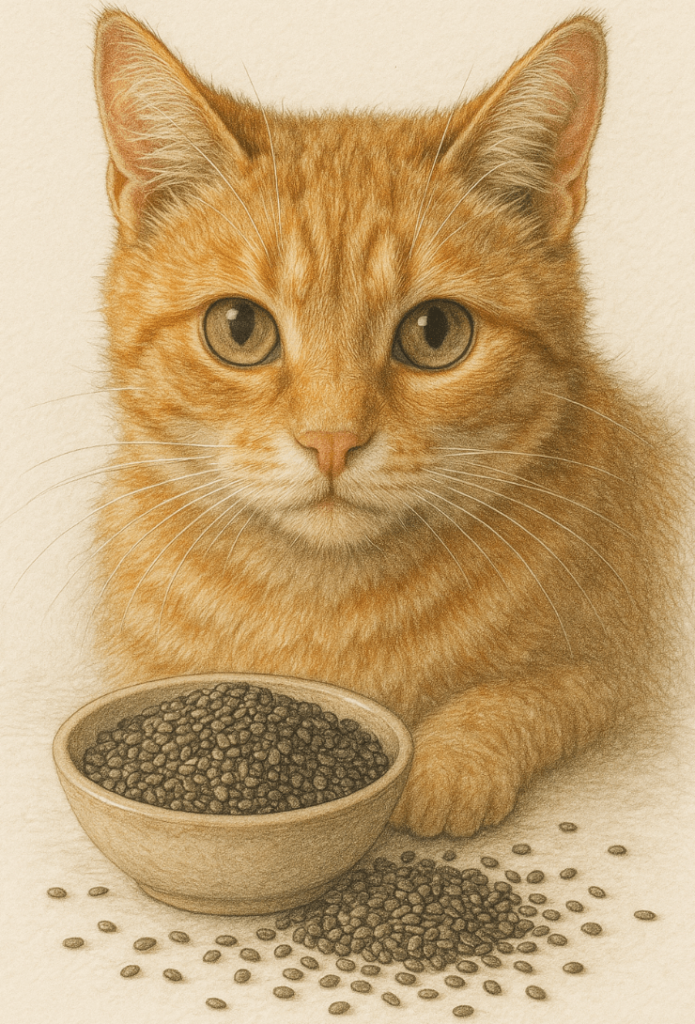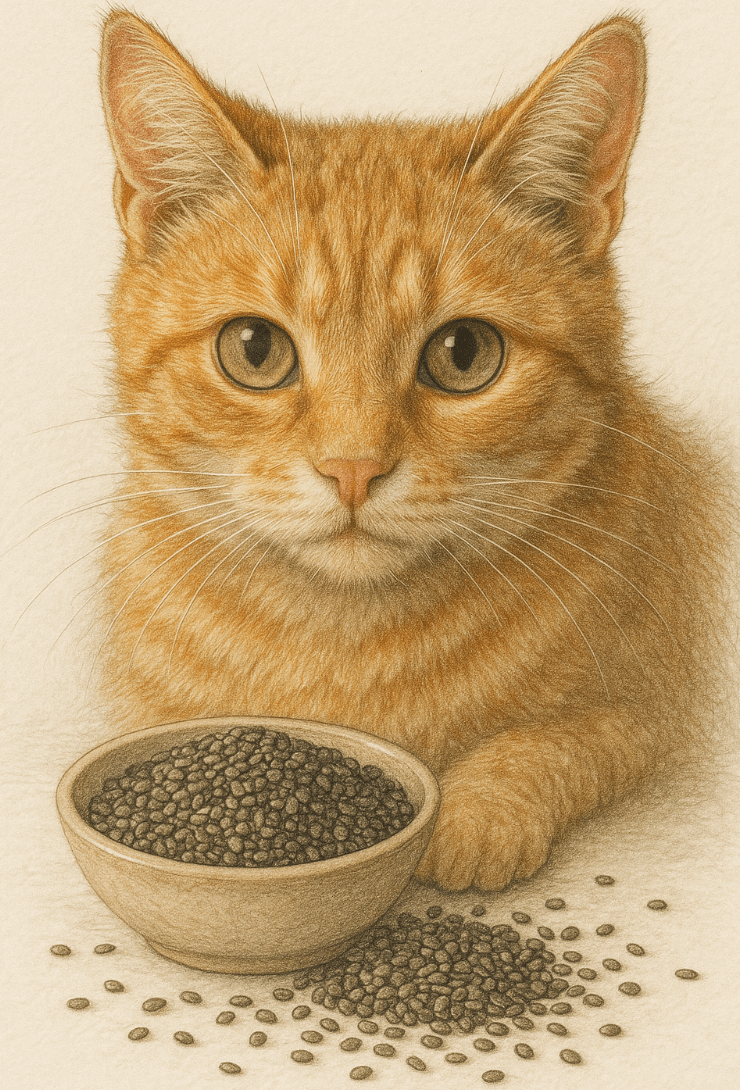Can Cats Eat Chia Seeds?
Chia seeds have gained immense popularity in recent years as a superfood packed with nutrients like omega-3 fatty acids, fiber, and antioxidants. While they’re a healthy addition to many human diets, pet owners often wonder whether these tiny seeds are safe for their feline companions. Cats, being obligate carnivores, have unique dietary needs that differ from humans or even dogs. So, can cats eat chia seeds? The short answer is yes—but with important caveats. In this blog post, we’ll explore the potential benefits, risks, and proper ways to introduce chia seeds into your cat’s diet. By understanding how to incorporate them safely, you can ensure your furry friend stays healthy and happy.
Potential Benefits of Chia Seeds for Cats
When fed in moderation, chia seeds can offer some surprising health benefits for cats. However, it’s essential to understand their role as a supplement rather than a staple food. Here are some advantages of including chia seeds in your cat’s diet.
Rich in Omega-3 Fatty Acids:
Omega-3s support skin health, reduce inflammation, and may improve coat shine and softness.High Fiber Content:
The fiber in chia seeds can aid digestion and help regulate bowel movements, especially in cats prone to constipation.Antioxidant Properties:
Chia seeds contain antioxidants that may help combat oxidative stress and support overall immune function.Hydration Support:
When soaked, chia seeds absorb water and form a gel-like consistency, which can contribute to your cat’s hydration.Low Calorie and Nutrient-Dense:
As a low-calorie food, chia seeds can provide nutrients without significantly increasing calorie intake.
While these benefits make chia seeds an appealing option, moderation and careful preparation are key to avoiding potential downsides.
Risks of Feeding Chia Seeds to Cats
Although chia seeds are generally safe, there are risks associated with improper feeding. Understanding these dangers will help you avoid complications and keep your cat healthy.
Digestive Upset:
Introducing too much fiber too quickly can lead to diarrhea, vomiting, or bloating in cats.Choking Hazard:
Dry chia seeds can expand in the throat or stomach, potentially causing blockages if not soaked beforehand.Nutrient Imbalance:
Overfeeding chia seeds may disrupt the balance of your cat’s carnivorous diet, leading to deficiencies in essential nutrients.Allergic Reactions:
Though rare, some cats may develop allergies or sensitivities to chia seeds, resulting in itching or gastrointestinal issues.Weight Gain Risk:
While low in calories, excessive amounts of chia seeds can still contribute to weight gain if paired with high-calorie foods.
By being aware of these risks, you can take steps to minimize potential problems and ensure your cat enjoys the benefits safely.
Check this guide 👉Can Cats Eat Ants? Best 7 Expert Tips!
Check this guide 👉Can Cats Eat Ketchup? Best 7 Expert Tips!
Check this guide 👉Can Cats Eat Hummus? Best 7 Expert Tips!

Benefits of Chia Seeds for Cats | Risks of Feeding Chia Seeds to Cats |
|---|---|
Supports skin and coat health | May cause digestive upset |
Aids in hydration | Risk of choking if not soaked |
Provides antioxidants | Can lead to nutrient imbalances |
Low-calorie supplement | Possible allergic reactions |
Promotes healthy digestion | Potential weight gain if overfed |
How to Safely Feed Chia Seeds to Your Cat
If you decide to try chia seeds with your cat, it’s crucial to follow these guidelines to ensure their safety and comfort.
Start with Small Amounts:
Begin by offering just a pinch (about ¼ teaspoon) to see how your cat reacts before increasing the portion.Soak the Seeds First:
Always soak chia seeds in water for at least 10-15 minutes to prevent expansion in your cat’s throat or stomach.Mix with Familiar Foods:
Blend soaked chia seeds into wet cat food or mix them with broth to make them more palatable.Monitor for Reactions:
Watch for signs of digestive distress, such as vomiting or diarrhea, after introducing chia seeds.Consult Your Veterinarian:
Before making any dietary changes, seek advice from your vet to confirm it’s suitable for your cat’s specific needs.
Following these steps ensures a smooth introduction of chia seeds into your cat’s diet.
Signs Your Cat May Not Tolerate Chia Seeds
While most cats tolerate chia seeds well, some may experience adverse reactions. Recognizing these signs early allows you to act promptly and protect your cat’s health.
Vomiting or Diarrhea:
These symptoms indicate digestive upset, likely caused by consuming too many chia seeds.Lethargy or Discomfort:
If your cat seems unusually tired or restless, it could signal an intolerance or allergic reaction.Excessive Grooming:
Cats may groom excessively if they feel unwell or irritated by something in their diet.Loss of Appetite:
Refusal to eat may occur if your cat finds chia seeds unpalatable or experiences nausea.Swollen Face or Paws:
Swelling is a sign of an allergic reaction, requiring immediate veterinary attention.
Recognizing these warning signs ensures you can address any issues quickly and responsibly.
Common Mistakes to Avoid When Feeding Chia Seeds
Feeding chia seeds to your cat requires attention to detail to avoid mistakes that could harm their health. Here are some pitfalls to watch out for.
Overfeeding:
Giving too many chia seeds can overwhelm your cat’s digestive system and lead to discomfort.Skipping the Soaking Step:
Offering dry chia seeds poses a choking hazard and can cause gastrointestinal blockages.Ignoring Individual Tolerance:
Each cat is different—what works for one may not work for another. Pay attention to your cat’s unique reactions.Adding Too Many Supplements:
Combining chia seeds with other supplements can upset your cat’s nutritional balance.Neglecting Veterinary Advice:
Skipping a vet consultation increases the risk of unknowingly harming your cat.
Avoiding these mistakes ensures a safer and healthier experience for your cat.
Alternatives to Chia Seeds for Feline Nutrition
If you’re hesitant about feeding chia seeds, there are plenty of alternatives that provide similar benefits without the potential risks.
Pumpkin Puree:
Rich in fiber, pumpkin puree supports digestion and helps relieve constipation or diarrhea.Fish Oil Supplements:
Fish oil is an excellent source of omega-3 fatty acids, promoting skin and coat health.Bone Broth:
Low-sodium bone broth provides hydration and joint-supporting nutrients like collagen.Cooked Eggs:
Eggs are a great source of protein and can be offered occasionally as a treat.Cat-Specific Probiotics:
Designed for felines, probiotics support gut health and boost immunity.
These alternatives cater to your cat’s natural dietary needs while minimizing potential risks.
Understanding Your Cat’s Dietary Needs
Cats have unique dietary requirements as obligate carnivores, meaning their bodies rely on animal-based proteins for optimal health. Understanding these needs helps you make informed decisions about supplements like chia seeds.
High Protein Requirement:
Cats need diets rich in animal protein to thrive, as plant-based foods cannot fully meet their amino acid needs.Limited Carbohydrate Tolerance:
Unlike humans, cats have limited ability to process carbohydrates, making high-fiber foods like chia seeds less ideal in large amounts.Essential Nutrients:
Taurine, arachidonic acid, and vitamin A are critical nutrients that must come from animal sources.Hydration Importance:
Cats naturally have low thirst drives, so moisture-rich foods are vital for preventing dehydration.Individual Preferences:
Every cat has unique tastes and tolerances; what works for one may not suit another.
By respecting your cat’s dietary needs, you can create a balanced and nutritious feeding plan that keeps them thriving.
Frequently Asked Questions About Cats and Chia Seeds
Are chia seeds toxic to cats?
No, chia seeds are not toxic, but they should be fed in moderation to avoid digestive issues.
Can kittens eat chia seeds?
It’s best to avoid giving chia seeds to kittens, as their digestive systems are still developing.
How much chia seed can I give my cat?
Stick to no more than ¼ to ½ teaspoon per day, depending on your cat’s size and tolerance.
Do chia seeds replace cat food?
No, chia seeds are a supplement and should never replace a balanced, meat-based diet.
What if my cat accidentally eats dry chia seeds?
Monitor your cat closely for signs of choking or digestive upset; contact your vet if needed.
Feeding Chia Seeds to Cats: Proceed with Caution
Chia seeds can be a nutritious addition to your cat’s diet when fed responsibly and in moderation. Their omega-3 content, fiber, and antioxidant properties offer potential health benefits, but they also come with risks if not handled properly. By starting small, soaking the seeds, and monitoring your cat’s response, you can safely incorporate this superfood into their meals. Always remember that cats are obligate carnivores, meaning their primary diet should consist of high-quality animal protein. With careful consideration and veterinary guidance, you can enhance your cat’s nutrition while keeping them safe and satisfied.
Do Cats Have Taste Buds? Best 7 Expert Tips! – Discover how cats experience flavors and why their taste is so unique.
Do Dogs Have Taste Buds? Best 7 Expert Tips! – Discover how dogs experience taste, their preferences, and what it means for their diet and health.
Can Cats Taste Sweet? Best 7 Expert Tips! – Discover why cats can’t taste sweetness, how it affects their diet, and tips to keep them healthy and happy.
Can Dogs Taste Sweet? Best 7 Expert Tips! – Discover how dogs perceive sweetness, which foods are safe, and tips to manage their sweet cravings responsibly.





